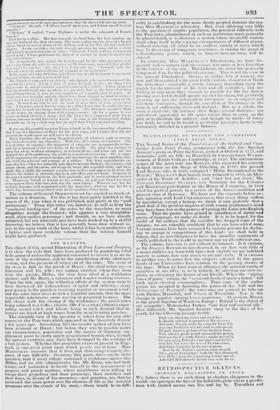TRANSLATIONS OF OXFORD AND CAMBRIDGE LATIN potze ts s.
THE Second Series of the Translations rf the Orford and Cam- bridge Latin Prize Poems, commences with the late Speaker
Anises:l.s poem on Peter the Great, recited at Oxford in 1777, and terminates with tin Ode on Hannibal, by Cnasseornea Weans- woRTs', of Trinity College, Cambridge, in 1828. The intermediate names of the most note are BowtEs, who exercised his scarcely fledged muse on the Siege of Gibraltar, in 1799 ; the present Lord RIPON, who, in 1801, eulogized "Malta Surrendered to the British ;" MILl.siAVS first laurels were achieved in 1s13, on Alex- ander at the Tomb of Achilles ; and, " last but not least," Mr. Eows tP GEoetatev STANLEY, now Secretary for the Colonies and Al ini,terial prizefighter in the House of Commons, in 1819 tried his poetical powers in a review of the former condition and present state of Syracuse. We have not the originals before us; but, agreeing with Lord CHESTERFIELD, that every thing suffers by translation except a bishop, we think it very probable that a good deal of the peculiar impress of each young gentleman's mind may have been lost in the process of turning the Latin into English verse. That the poems have gained in smoothness of metre and purity of language, we make no doubt. It is to be hoped, for the credit of the authors, that the versifier has dropped some of tile images; we are tolerably confident that he can have added none. 'Various reasons have been assigned by various persons for declin- ing to engage in competitions of this kind : we shall hold in future, that an unwillingness to have the maudlin sentiments of youth published to the world in maturer age an all-sufficient one.
The volume, however, is not without its interest. It is curious, as Sir JOSH UA REYNOLDS has observed, to see how very little of a man's abilities are born with hiin—how slightly WC are indebted merely to nature, how very much to art and study. It is curious in another way, to notice bow the subjects selected by the grave heads of our Universities have relation to the passing events of the time. When we have wars or alliances, the national vanity of ourselves or our allies is to be fielded, by selecting our own ex- ploits, or eulogizing the heroes of our friends. When the " piping times of peace " return, the " reverend heads of many a house" fait back upon classical commonplaces. Thus some of the earlier poems are occupied in hymning the praise of the Nile and the Delirerance of Portugal; the later ones are content to take up with Thebes, Hannibal, and Cicero at Tusculum. Nor is the change in popular opinion less conspicuous. At present, Russia is the grand bugaboo of Western Europe; Poland is the object of one sympathy ; Mahomedan Turkey "our dear and ancient ally.- How differently Mr. Speaker Almon. sung- in the days of his youth, let the th110..ving passage testify.
High o'er admiring- states and rival foes In wealth and war transcendent lin,sia rise; And nmv, though strife, by vengeful Envy led, Aspiring Frederick o'er her land would spread, Though :1u-trio. jealous of her brighter hour, \t it.h adverse perils would surround her power, Still not the less bath litts:ia's might prevaird, Or struggling Poland's vain aggression faint; Still bids Err voice the war of Faction cease, And binds s:irinatia in the ties of peace. Now by ill' ..Egean's furthest coast array'd, Thee, proud Byzantium ! hart her fleet dismayed, )'e'rIlene', deep the conquering banner spa cad, And tiff(' Mohammed's hostile race with drvad.




















 Previous page
Previous page